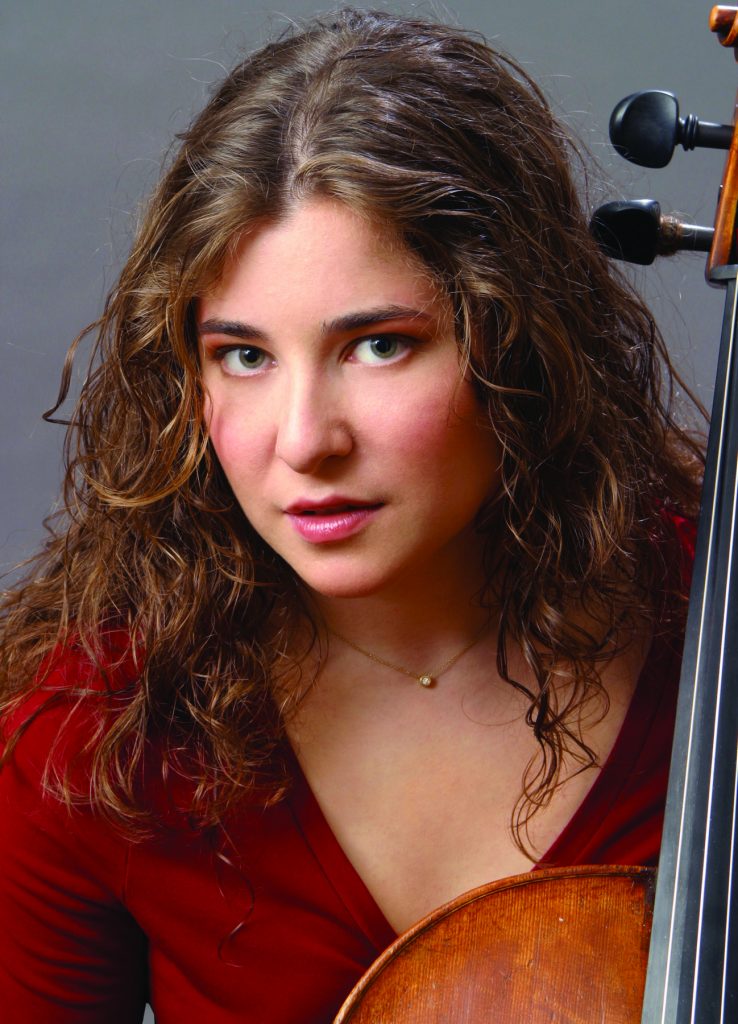Alisa Weilerstein’s Sublime Bach Cello Suites at The Conrad in La Jolla
Alisa Weilerstein’s breathtaking recital of three J. S. Bach Cello Suites at The Conrad in La Jolla on Tuesday opened a new chapter for the San Diego Symphony. The orchestra has wisely moved its Chamber Music Series from various downtown locations to the Baker-Baum Concert Hall in the La Jolla Music Society’s acclaimed new Conrad Prebys Performing Arts Center.

Alisa Weilerstein [photo (c.) Christian Steiner]
Weilerstein started playing in the La Jolla Music Society’s (LJMS) SummerFest in 2006 when she was a mere 24 years old, and has returned to the festival frequently. When the LJMS brought the noted Academy of St. Martin in the Fields Orchestra to San Diego in 2013, Weilerstein amazed the Balboa Theatre audience with her spectacular account of the Haydn C Major Cello Concerto as the orchestra’s guest soloist. Since her husband, the Venezuelan conductor Rafael Payere, has commenced his relationship with the San Diego Symphony, Weilerstein has made major impressions on Copley Symphony Hall audiences performing that chestnut of Tchaikovsky’s Rococo Variations for Orchestra as well as the surprising rarity of Benjamin Britten’s Symphony for Cello and Orchestra, both played in January of this year. This coming weekend–November 15 & 17–she will solo with the San Diego Symphony in Ernest Bloch’s Schelomo, Hebraic Rhapsody and in Richard Strauss’s Don Quixote, with Payare on the podium.
Weilerstein not only brings to every piece she performs the requisite stylistic acumen it deserves, but, more importantly, she assuredly discovers its emotional center of gravity and gracefully pulls her listeners into its intoxicating vortex. On Tuesday, her Bach solo cello suites unfolded with such polished finesse, I could forgive the casual listener for failing to percieve the immense technical prowess required for such a feat. Of greater importance, of course, was the depth of spirit she communicated in every suite movement.
Suite No. 2 in D Minor, BWV 1008, opened her program. Weilerstein delicately shaded the Prélude’s gentle triadic figures, etched in understated dynamic levels, to invite her audience on her Bach journey. In the more propulsive Allemande, her airy double-stops reverberated gracefully in Baker-Baum’s comfortable acoustic, which also favored her gossamer textures. Bach made the opposite moods of the vibrant Courante and dreamy Sarabande the center of each Suite, and Weilerstein made the most of this dramatic tension. Her cascading descending figures in the D Minor Suite’s Courante thrilled without sacrificing an iota of her sparkling precision, and the excitement of the movement was allowed to mellow in her luxurious, tranquil reading of the ensuing Sarabande. Her pair of Menuetts continued the cool-down, an apt preparation for her brightly articulated gambol through the closing Gigue.
Weilerstein appropriately opened up her sonority in the sunnier E-flat Major Cello Suite, BWV 1010. In Bach’s sacred music, this key was a symbol for the Holy Trinity: the wondrous E-flat Major Organ Prelude that opens the Third Volume of Bach’s Clavierübung is a splendid example of Bach’s musical divine majesty, and I heard in Weilerstein’s account of his E-flat Cello Suite a parallel strength and grandeur, especially in the opening and closing movements.
The Cello Suite No. 6 in D Major, BWV 1012, proved the longest and most elaborate suite on Weilerstein’s program, and it made a satisfying second half of her program. The clarion power of her instrument’s upper range added to the ebullience of the Prélude, and she adroitly sculpted the sinuous Allemande themes that at times threatened to become more labyrinth than graceful dance. After the Courante’s ferocious figurations, she settled comfortably into the glowing double-stops and impressive counterpoint of the Sarabande. If the Gigue’s opening theme sounded a bit simple, it was merely Bach’s clever feint that allowed him to quickly drive to a flamboyant grand finale, which Weilerstein accomplished with verve.
This recital was presented by the San Diego Symphony at the Conrad Prebys Performing Arts Center in downtown La Jolla on Tuesday, November 12, 2019.

Ken Herman, a classically trained pianist and organist, has covered music for the San Diego Union, the Los Angeles Times’ San Diego Edition, and for sandiego.com. He has won numerous awards, including first place for Live Performance and Opera Reviews in the 2017, the 2018, and the 2019 Excellence in Journalism Awards competition held by the San Diego Press Club. A Chicago native, he came to San Diego to pursue a graduate degree and stayed.Read more…
